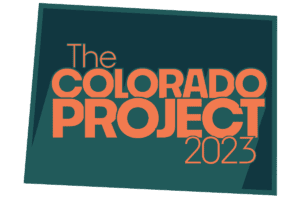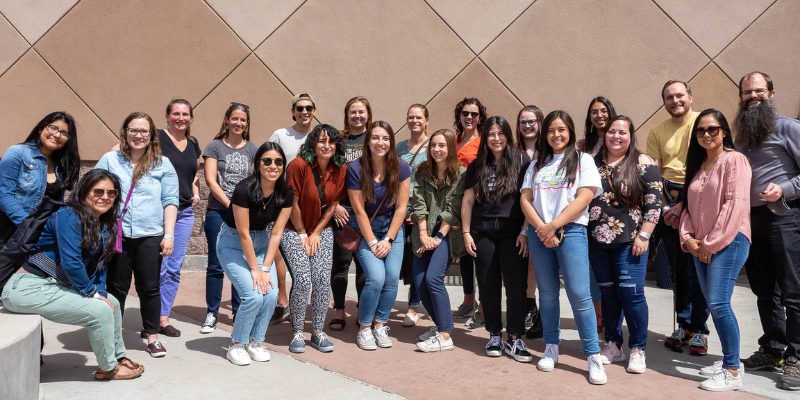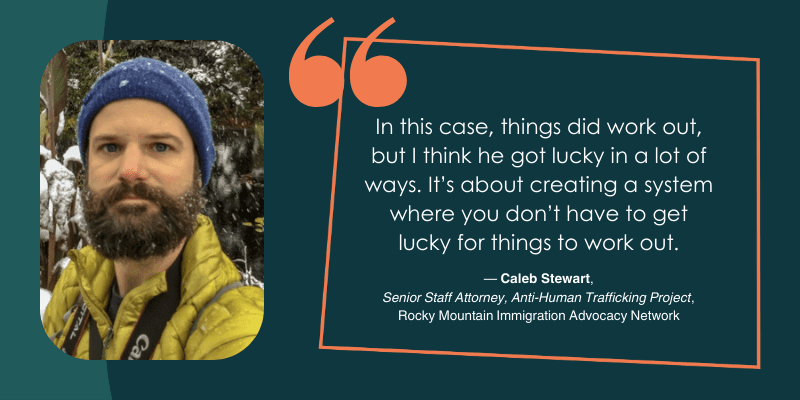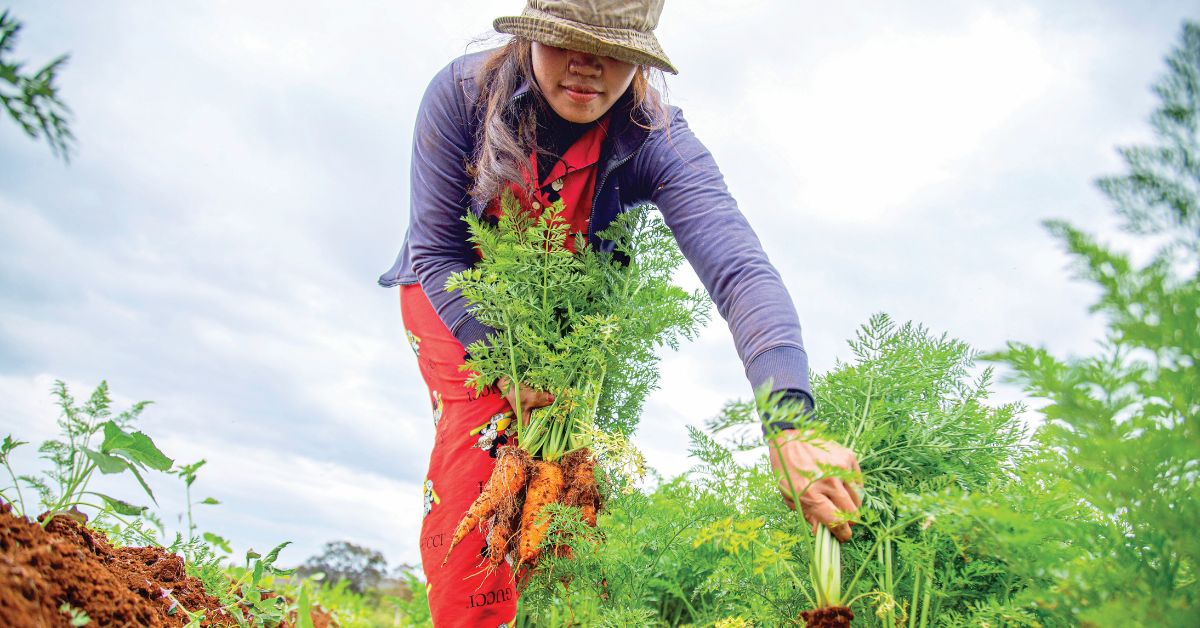Partnership Spotlight with Rocky Mountain Immigrant Advocacy Network
 The following story is a part of a special series that highlights the release of the Laboratory to Combat Human Trafficking’s research report, The Colorado Project 2023. This series provides a platform for the diverse voices and partnerships working together to end human trafficking across our state. Discover why trust, equity, and effectiveness are critical elements of the anti-trafficking movement.
The following story is a part of a special series that highlights the release of the Laboratory to Combat Human Trafficking’s research report, The Colorado Project 2023. This series provides a platform for the diverse voices and partnerships working together to end human trafficking across our state. Discover why trust, equity, and effectiveness are critical elements of the anti-trafficking movement.
Human trafficking is a global humanitarian crisis that we must work to solve at a local level. With cooperation and collaboration, we can pool the knowledge and resources of our communities to end it. In Colorado, the Laboratory to Combat Human Trafficking works with government agencies and community organizations to develop an effective, unified solution for ending human trafficking. One element of that equation is the Rocky Mountain Immigration Advocacy Network (RMIAN).
Often called “Remain” by those involved, RMIAN does exactly that — help immigrants and undocumented individuals remain in the United States. While a group of immigrant attorneys founded RMIAN in the early 90s to serve low-income men, women, and children in immigration proceedings; today, that mission has expanded to include their Anti-Human Trafficking Project.

Pictured: Staff members (most of the team) at RMIAN
Vulnerabilities of Migrant Workers to Labor Trafficking
The Human Rights Center at the University of California, Berkeley, estimates that at any given moment, at least 10,000 people work as forced laborers in the United States. The Laboratory to Combat Human Trafficking defines labor trafficking as the recruitment, harboring, transportation, provision, or obtaining of a person for labor or services, through the use of force, fraud, or coercion for the purposes of subjection to involuntary servitude, peonage, debt bondage, or slavery. Migrant workers with and without visas are disproportionately targeted by labor traffickers due to a combination of a lack of legal protections, pressing financial need, and a wariness of authority figures and law enforcement.
Caleb Stewart is the Senior Staff Attorney at the Anti-Human Trafficking Project. Much of his work with clients involves helping them understand their rights and how they can qualify for a visa. Survivors of human trafficking may be eligible for a T Visa, a special nonimmigrant status established by the Victims of Trafficking and Violence Protection Act in 2000.

Advocating for Trafficking Survivors as They Navigate Legal Status
“Labor exploitation can be extremely difficult and cruel for the individual, even if it doesn’t meet the legal definition of human trafficking,” says Caleb. Caleb works with survivors to unpack their experiences and help them understand which specific moments will matter most in their quest for legal residence status. “It may not be the part of their experience that was the most damaging or the most traumatic to [them], but it may be the part of the experience that may make [them] eligible for a visa.”
RMIAN takes a multi-pronged approach to supporting survivors of human trafficking. They provide free legal services and coordinate specialized social services for detained immigrants. They also host trainings on human trafficking for service providers, attorneys, law enforcement, children’s advocates, juvenile justice and criminal court officials, community members, and others to raise awareness of this human rights violation, help them identify the signs to look out for, and understand the correct steps to take if they suspect there is human trafficking happening in their community.
Caleb and his team emphasize the importance of trauma-informed care, where advocates and allies listen to the survivor’s needs first and foremost. Sometimes, these survivors need a safe space to heal, rather than law enforcement and a courtroom.

Pictured: Children’s team staff members (most of the team) at RMIAN
The Path to Justice—and Healing
Caleb recalls one such particular case: after receiving a tip about potential child abuse in a foster home, Child Protective Services and the Innocence Lost Task Force (a joint effort between the FBI and Colorado State Patrol) investigated and found that the foster parents were forcing the young man to work in the home. Recognizing the signs of labor trafficking, investigators connected the survivor, who was undocumented, with RMIAN. He wanted to be removed from that unsafe space, but did not want to prosecute those responsible. For many survivors, the shortest path to healing is to put the experience behind them, rather than endure lengthy legal proceedings where they must continue to face their traffickers daily.
RMIAN worked with the young man to file for his T Visa, whose life remained unstable as he tried to find his place in America while earning money to send back home to his family abroad. The process was difficult. When Caleb received a request for evidence from the federal Immigration and Citizenship Services, he needed the young man’s help to continue the Visa process. But given the unstable nature of his lifestyle, the young man would vanish and reappear over months. With an upcoming hearing and no way to respond to the request for evidence, Caleb feared their try for a T Visa would fall through.
But a series of lucky breaks came at just the right time. The outbreak of COVID-19 led to the hearing’s cancellation, and a second request for evidence gave them a second chance. Caleb tracked down and reconnected with the young man through Facebook. As he found a more stable situation for himself, he became more communicative. Together, he and Caleb were able to get him approved for a T Visa. Now, that young man is working towards becoming a permanent resident in the United States.

Creating Systems to Empower Communities and Survivors
Caleb points to this story as an example of what can happen when community members recognize and respond to the signs of labor trafficking — and how survivors can reach a safer, more humane situation without tangling themselves in criminal proceedings. “In this case, things did work out, but I think he got lucky in a lot of ways,” says Caleb. “It’s about creating a system where you don’t have to get lucky for things to work out.”
Caleb’s goal with the Anti-Human Trafficking Project is to expand this network across more cities, counties, and states so that people will know the signs of trafficking to look for, and that they can look to immigration assistance for help in many of these cases. More communities with highly trained and knowledgeable individuals can better identify the signs of human trafficking and therefore, help more survivors. It’s a simple but powerful equation.
But you won’t find equations like that one scribbled on chalkboards at the Laboratory to Combat Human Trafficking. “Laboratory” is in our name because collaboration is at the heart of what we do — create spaces where dedicated minds come together to create research-backed change. Partnerships with organizations like RMIAN are crucial for ending human trafficking in Colorado. It’s a complex puzzle that will take all of us, including attorneys like Caleb, law enforcement, policymakers, volunteers, educators, social workers, and allies and advocates from every industry.
The Colorado Project is a community-based, research-focused approach to ending human trafficking in Colorado. Led by the nonprofit the Laboratory to Combat Human Trafficking (LCHT), The Colorado Project began in 2010 as a rigorous grassroots research project that helps us uncover what human trafficking looks like in Colorado, what has been done in the past to address it, and what we can do in the future to end it. LCHT released the third iteration of The Colorado Project results in October, 2023. This time, The Colorado Project 2023 revealed that cross-sector partnerships, staff training in key sectors such as healthcare and education, and addressing housing insecurity are key to ending human trafficking in Colorado.

